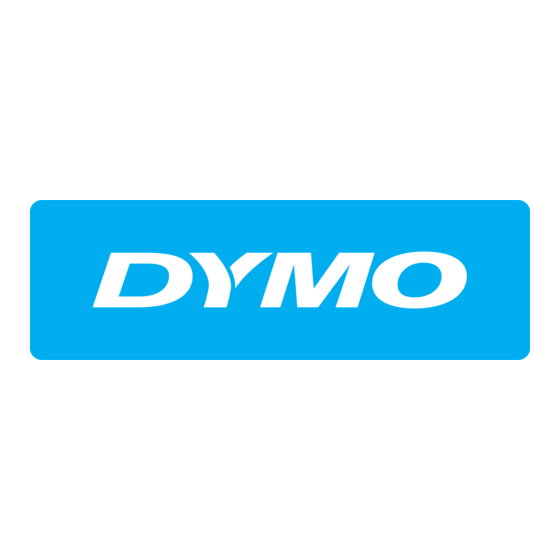Dymo LabelManager 500TS Manuel de l'utilisateur - Page 10
Parcourez en ligne ou téléchargez le pdf Manuel de l'utilisateur pour {nom_de_la_catégorie} Dymo LabelManager 500TS. Dymo LabelManager 500TS 19 pages. Dymo labelmanager 500ts label maker
Également pour Dymo LabelManager 500TS : Manuel de l'utilisateur (19 pages), Vue d'ensemble (2 pages), Spécifications (2 pages), Manuel rapide (2 pages), Manuel de référence rapide (17 pages)

To set the time
Tap
on the Home screen.
1
Select Time from the settings list.
2
Select the current hour and minutes.
3
Do one of the following:
4
• To use 24-hour time format, select the Use 24-
hour time check box.
• To use 12-hour time format, clear the Use 24-
hour time check box, and then select AM or PM
from the list.
Tap Done.
5
To insert the date and time
Select Auto-fields and Barcodes on the Insert tab.
1
Tap Date and Time.
2
The Insert Date and Time dialog box appears.
To insert the date, do the following:
3
Select the Date check box.
a
Select the desired date format from the list.
b
To insert the time, do the following:
4
Select the Time check box.
a
Optionally, select the Use 24-hour time check
b
box.
To automatically update the date and time each time
5
the label is printed, select the Auto-update date and
time check box.
Tap OK.
6
The date and time fields are inserted on the label.
The date and time fields are each treated as a single
character on the label. You can delete these fields just as
you would any other character.
Inserting Barcodes
You can print the following types of barcodes:
UPC-A
Code 128 B
UPC-E
Code 39
You can choose whether or not to print the barcode text
and you can choose to print the barcode text either
above or below the barcode.
Optionally, you can add text before, after, above, or
below the barcode.
This User Guide assumes that you already
understand the differences between barcode types and
have a plan in place to incorporate barcodes into your
organization. If you need to learn more about barcodes,
many excellent how-to books are available at local
libraries and book stores.
EAN 13
EAN 8
10
To insert a barcode
Select Auto-fields and Barcodes on the Insert tab.
1
Tap Barcode.
2
The Insert Barcode dialog box appears.
Select a barcode type from the Barcode type list.
3
Enter the data for the barcode in the
4
Barcode data box.
To insert a symbol, tap Add symbol and select
the desired symbol.
From the Show barcode data list, select one of the
5
following:
• Below barcode -to place the barcode text below
the barcode.
• Above barcode - to place the barcode text above
the barcode.
• Not displayed - to not print the barcode text.
Tap Choose layout, and then do the following:
6
• Select a size for your barcode from the Barcode
size list.
For best results, select Medium.
• Select the desired barcode position relative to
other text on the label.
Tap OK.
7
The barcode is inserted on the label.
The barcode is treated as a single character on the label.
You can delete the barcode just as you would any other
character.
Inserting Days, Months, or Quarters
You can automatically insert the names of days, months,
or quarters on your label. When you choose to insert
days, months, or quarters, a label is created for each day,
month or quarter you select.
Days, months, and quarters cannot be combined
on a single label. Only one of these names can be used
at a time.
To insert days, months, or quarters
Select Auto-fields and Barcodes on the Insert tab.
1
Tap Days, Months, or Quarters.
2
The corresponding dialog box appears.
Select the day, month, or quarter names to use.
3
A label is created for each day, month, or quarter you
selected.
To abbreviate day, month, or quarter names, select
4
the Abbreviate check box.
Tap OK.
5
The selected field is inserted on the label.
The field is treated as a single character on the label. You
can delete this field just as you would any other character.
See Printing a Series of Labels on page 13 for
information about printing labels with day, month, or
quarter names.
